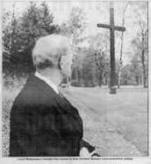
NAZI CONCENTRATION CAMP
FORMER LAGAN VALLEY MP RECALLS THE TRAUMA OF NAZI CONCENTRATION CAMP
 If I hadn't seen what I did at Belsen I don't think I would have believed someone could do
those things to another living person'
If I hadn't seen what I did at Belsen I don't think I would have believed someone could do
those things to another living person'
Its now more than 55 years on, but the memories of the Nazi concentration camp at Belsen will always be with Jim Molyneaux.
As a corporal in the RAF since 1941, the former Lagan Valley MP experienced many of the horrors in the Second World War, but nothing could have prepared him for the scale of devastation he witnessed first hand at Belsen in April 1945.
Lord Molyneaux has never been able to forget the `pure evil' that he encountered as he saw first hand how thousands of prisoners had suffered and died under the harsh Nazi regime.
Only recently the former Ulster Unionist leader travelled back to Belsen as part of a BBC Spotlight programme and relived his experiences.
Although the area has changed since 1945 it was all too familiar to Lord Molyneaux as he retraced his steps.
Just 24-years-old in 1945, Lord Molyneaux had been away from home since 1941 after enlisting in the RAF following the Blitz in Belfast.
He took part in the D-Day landings and travelled across Europe as the Allies liberated major cities including Paris and Brussels.
But as Lord Molyneaux's thoughts turned to home with the Nazis on the brink of defeat, he was asked to aid the medical relief effort in the concentration camp at Bergen-Belsen in Lower Saxony.
The horror began with his first glimpse of the camp's perimeter. The camp's prisoners, including civilians and military personnel, had been the victims of unspeakable evil.
"On the fence were skeletons of men and women, who in their sheer desperation had deliberately put their claw-like fingers on that electric fencing and electrocuted themselves and of course no-one bothered to take them off it," said Lord Molyneaux.
"Every step you took revealed further horrors. It was the sort of stuff of which nightmares were made."
The nightmare had only just begun. Inside the camp 17,000 bodies of civilian and military prisoners lay scattered in great heaps. In prison huts the dead and the living lay mingled.
Disease was rife and typhus would eventually claim another 13,000 lives after liberation.
But while Lord Molyneaux and his colleagues were assigned to give medical relief, in so many instances there was nothing they could do.
The chief medical officer informed Lord Molyneaux about the dangers of giving some prisoners any food at all.
"While they did feed them with liquid we were not able to offer some of the prisoners solid food like chocolate or sweets because they would have deteriorated to such an extent that food would just kill them solid dead," he recalled.
The medical officers decided who was going to have a chance of living. They had accepted some people were not going to live the day out. There was another similar group who would probably only live for a day or two but then there was another group who retained some hope of recovery and that's who we concentrated on helping."
Incredibly, cruelty still continued by the German SS guards who had chosen not to flee the camp. They were still forcing the living to bury their own dead.
"A German soldier was ill-treating two of these prisoners and I have to admit that I broke the Geneva Convention and laid on him with the one stick I could get hold of," said Lord Molyneaux.
He has never forgotten his war-time experiences and while many have stood him in good stead for public life, some still come back to haunt him.
Images of the prisoners in their striped blue uniforms are particularly evocative. "I cannot ever wear striped blue pyjamas for the simple reason that this was the uniform in the concentration camps. If you imagine thousands of people in striped blue and white pyjamas wandering about like skeletons and some of them falling dead before you," he said.
If I visit a hospital or I see someone wearing those I find myself having to look away. Images of the prisoners come back to me. You have to remember that many of those people wouldn't have been alive that very evening."
The experiences have given Lord Molyneaux a real appreciation of humanlife but at the same time create a natural distrust of human beings too. He believes another human race could capable of recreating such atrocities.
"You would never write people off as being nonentities and I think you have to place a certain amount of importance to every human being," he added. "If I hadn't seen what I did at Belsen I don't think I would have believed someone could do those things to another living person."
